Riding the Wave of Boris
The Music Series > Asakusa Jinta > Boris > Shibusashirazu > Mad3 > Keiji Haino > Ghost > Overhang Party
The last time the Captain picked up a musical instrument the owner of the pawn shop suggested he first pay for the harmonica before stuffing it in his pocket.
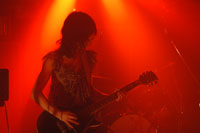 This week he is in the audience for Boris, Japan's rocking masters of drone. And yes, get those earplugs set before proceeding.
This week he is in the audience for Boris, Japan's rocking masters of drone. And yes, get those earplugs set before proceeding.
Many would prefer that such musical genres as psychedelic and hard rock, circa 1970, be tossed onto the dust heap of obsolescence right next to shag carpet. Not so for Boris, a Japanese trio which for more than a decade has been wrapping itself around that era's kaleidoscope of sound.
Kicking off a recent show at Shimokitazawa's Shelter club is "Rafflesia," a sonic blast of feedback and fire that slowly floats over the audience not unlike a dry wind. The song is the first track off last year's "Rainbow," the band's Pedal Records collaboration with guitarist Michio Kurihara, perhaps best known for his playing with folk-rock band Ghost.
"At first, I didn't know much about Ghost," explains drummer Atsuo a few days later from the offices of the band's primary Japanese label, Inoxia. "I had watched Kurihara play guitar with [Japanese rock bands] Yura Yura Teikoku, The Stars, and Ai Aso Group. As well, Kurihara was a guitarist in YBO2, which influenced us so much. Their style is heavy and noisy; it is so different from Ghost, but YBO2 is similar to Boris. So you can see that Kurihara has a wide variety of styles."
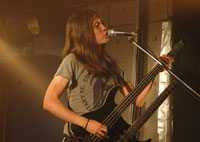 YBO2, founded by bassist Masashi Kitamura in the '80s, was one of the pillars of Japanese hardcore, whose deafening and thrashing sound characterized the scene in the '80s.
YBO2, founded by bassist Masashi Kitamura in the '80s, was one of the pillars of Japanese hardcore, whose deafening and thrashing sound characterized the scene in the '80s.
For its part, Boris is devastating on stage. The group pummels its audience with wave after wave of extreme loudness.
"We try to create what we think to be an appropriate atmosphere for our sound with the audience," Atsuo says. "Cranking up the volume is a part of that. We feel that it is as important as such things as melody."
To demonstrate his impression of their sound, Atsuo holds both of his hands in front of himself and flaps them in an undulating motion. The message: Come surf the wave of Boris.
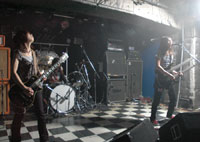 Bathed in bright back lights, the band, joined by Kurihara, blows through "Rainbow" - from the slow meandering instrumental "Fuzzy Reactor" to truly electric jams of "Sweet No. 1." The frail Wata is nearly motionless as her guitar rips out sheets of searing chords. Standing front and center, Takeshi is the most prominent. His dark mop of hair covers his face as he delivers his tortured vocals while playing his double-axed bass.
Bathed in bright back lights, the band, joined by Kurihara, blows through "Rainbow" - from the slow meandering instrumental "Fuzzy Reactor" to truly electric jams of "Sweet No. 1." The frail Wata is nearly motionless as her guitar rips out sheets of searing chords. Standing front and center, Takeshi is the most prominent. His dark mop of hair covers his face as he delivers his tortured vocals while playing his double-axed bass.
"The singing style of Boris is very much a hardcore style," explains Atsuo, who pounds away in relative anonymity in the shadows. "This is as a result of being directly influenced by Japanese hardcore."
Not coincidentally, this philosophy caught the attention of like-minded guitar-assault artist Keiji Haino. "There were only a few bands that had the same style," Atsuo says of the period when Boris met Haino. "So he asked us to work together." The result was 1998's "Black: Implication Flooding," a live recording featuring more noise and reverb than an improperly tuned radio signal.
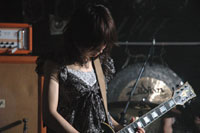 Boris, whose name was taken from a track on the Melvins' "Bullhead" album, made its debut on the 1994 Japanese compilation "Take Care of Scabbard Fish." The title of their 2002 release, "Heavy Rocks," succinctly describes the over-the-top odes to the likes of the Stooges found therein. This proved to be a contrast to the jam-inspired layering of such predecessors as "Flood" and "Amplifier Worship."
Boris, whose name was taken from a track on the Melvins' "Bullhead" album, made its debut on the 1994 Japanese compilation "Take Care of Scabbard Fish." The title of their 2002 release, "Heavy Rocks," succinctly describes the over-the-top odes to the likes of the Stooges found therein. This proved to be a contrast to the jam-inspired layering of such predecessors as "Flood" and "Amplifier Worship."
The band continually branches into new directions.
"The members of Boris like all kinds of music: hard rock, psychedelic folk, and acid rock," Atsuo explains. "The types of music we are interested in have been spreading wider. So we will not continue with the same general style. We want to enjoy each variation separately."
"Akuma no Uta (2003)," whose cover shows bassist Takeshi mimicking the seated pose of Nick Drake on his album "Bryter Layter," is a mixed bag of reverb and drawn-out jams.
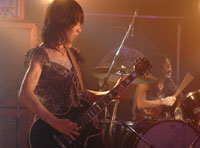 "Mabuta no Ura," from the year following, is a soundtrack for a film that was never made. "It's a fake," says Atsuo of the recording that is a shifting fog of ambience. "Usually you make the movie first and then the soundtrack. Well, we made the soundtrack and stopped. The concept is to make listeners imagine the film."
"Mabuta no Ura," from the year following, is a soundtrack for a film that was never made. "It's a fake," says Atsuo of the recording that is a shifting fog of ambience. "Usually you make the movie first and then the soundtrack. Well, we made the soundtrack and stopped. The concept is to make listeners imagine the film."
After playing together in Tokyo and Osaka, the eardrum-wrecking maestro Merzbow hooked up with Boris for a series of subsequent releases. The most recent of which is the somber "Sun Baked Snow Cave (2005)," a single track of shimmering hums and pulses.
"Pink," released overseas in 2006, was the band's true international breakthrough, registering on many year-end polls (Pitchfork: #9). The album drifts between thrash-metal and longer, feedback-filled washouts.
Atsuo, though, cannot give a reason for the success of "Pink," only offering a guess that the popularity of their label in the U.S., Southern Lord, has led to a kind of trickle-down benefit. When pressed to explain why a large portion of the audience at its Japan shows is foreign, Atsuo adds: "We are not a Japanese band."
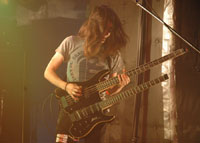 That irony has its place since it would be difficult to deny that part of the group's success - as evidenced by the collector frenzy for the band's seemingly neverending output of limited vinyl releases - can be attributed to the paradox found in a Japanese group pumping out thundering acknowledgements of the MC5.
That irony has its place since it would be difficult to deny that part of the group's success - as evidenced by the collector frenzy for the band's seemingly neverending output of limited vinyl releases - can be attributed to the paradox found in a Japanese group pumping out thundering acknowledgements of the MC5.
Atsuo doesn't see substantial changes to Boris in the future. Following short trips to the U.S. (for the SXSW showcase) and Australia, "Altar," the recent collaboration with Southern Lord labelmates Sunn0))), will be celebrated with "Wizard's Connection" - the title of a four-date tour of Japan set for May. The release will be reissued in Japan later this month as a part of a special vinyl triple-LP set (including two bonus tracks) by Daymare Recordings.
When told that a few audience members could be seen sneaking out of Shelter well before the final number - "Tenshi" (Angel), a cover played as a tribute to YBO2's Masahara, who passed away last year - Atsuo is not surprised.
"It was too loud!" he exclaims.
Mission accomplished.
Note: Yoko Kobayashi contributed to this report from the Tokyo bureau. "Rainbow" will be released in the U.S. on Drag City in May. Boris will be playing three shows at SXSW in Austin, TX. Details of the Japan tour with Sunn0))) can be found here.
The Music Series > Asakusa Jinta > Boris > Shibusashirazu > Mad3 > Keiji Haino > Ghost > Overhang Party

